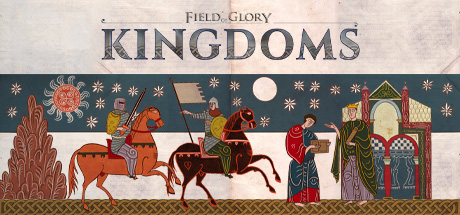We’re thrilled to announce that the second macrotopic Warfare and Fortifications of A Lens On - Snapshot has been completely released. Head over to the playlist (https://www.youtube.com/playlist?list=PLQrYLOdjwRhQZYBA0KsqsTfk10O8TtxRk) now to catch all the pills about Hierarchies and Livelihood.
But that's not all—before we dive into the next chapter, our friend DasTactic is took us on a deep dive into Field of Glory: Kingdoms.
Field of Glory: Kingdoms: A Strategic Saga of Medieval Wales
Field of Glory: Kingdoms immerses players in a grand strategy experience that intricately models medieval society, balancing layers of governance, warfare, and diplomacy. Each decision ripples across the game, with consequences that might not be felt until years later. A single misstep—such as overextending your authority—can jeopardize your entire kingdom, as demonstrated in this live-stream session featuring Wales.
Alt-History: A New Medieval Timeline
Our playthrough as Wales takes a dramatic turn, diverging sharply from the historical path of 1066. Caught in a heated conflict with Mercia, we find ourselves facing not only Mercia’s forces but also their overlord, England, and allied English kingdoms like Northumbria and East Anglia.
In the previous session, the Welsh army ambushed and decisively defeated the English King, Harold Godwinson, as he marched to join Mercian forces. Harold’s death during the rout shifted the timeline significantly. A new English king, Eadric, has ascended the throne, severing ties with Normandy and diminishing the likelihood of the Norman invasion. Meanwhile, Normandy finds itself embroiled in its own conflict with France, leaving us isolated and in a precarious position.
Manpower: A Kingdom’s Lifeblood
At the outset of this session, Wales faces a dire manpower shortage. The military upkeep has outpaced the recruitment capacity of our small towns and villages. Without enough soldiers to replenish our armies, units risk losing effectiveness and morale.
To address this, we decided to disband a contingent of skirmishing javelinmen, allowing these men to return to their farms and replenish the kingdom’s manpower pool. Long-term, a more sustainable solution lies in shifting the focus of agrarian territories toward urbanization by constructing hamlets and other centralized developments.
This delicate balance between maintaining a standing army and sustaining the kingdom’s economy underscores one of the game’s core challenges: every decision has a cost.
Terrain and Tactical Preparation
In Field of Glory: Kingdoms, terrain is a decisive factor in battles. Each unit type thrives - or falters - depending on the battlefield.
-
Welsh Army Composition:
Our army includes heavy Ostmen infantry, reminiscent of Viking axemen, who excel in open plains but struggle in rough terrain. We also field light and heavy cavalry, which are effective in flanking maneuvers on open ground but poorly suited to forests. Brythonic foot soldiers and skirmishing javelinmen round out our forces but are less effective in close terrain.
-
Terrain and Battle Frontage:
Terrain dictates the "frontage" of a battle, determining how many units can engage at once. Open plains, like those near Worcester, allow for a wide frontage of 18 units, including 6 for flanking. In contrast, forests narrow the frontage to 8, eliminating flanking opportunities and favoring defenders.
This tactical depth forces players to consider not only their army composition but also the terrain of potential battlefields. In this session, our ability to leverage open plains played a crucial role in countering the numerically inferior but highly skilled English forces.
The English Threat: Mercenaries and Raids
As 1061 progressed, a small but formidable English army appeared in Mercian territory. Comprised of Norman mercenary knights, English bowmen, and levied peasants, this force posed a significant threat despite its size.
Our strategy was twofold:
-
March our main army from Worcester into Hereford to intercept the English force.
-
Disband skirmishers retreating to Wales to preserve manpower.
The English force pursued our skirmishers into the Welsh hills, where they clashed with a hastily levied peasant force from our ally, Deheubarth. Despite their inexperience, the defenders managed to hold the line with support from our skirmishers, forcing the English to retreat.
Dynamic Gameplay: Fortifications and Opportunism
One standout feature of Field of Glory: Kingdoms is the dynamic way the game responds to threats. In this session, the people of Powys, sensing the looming danger of the English mercenary army, offered to construct temporary fortifications within a single turn. This reactive building mechanic adds depth and immersion, simulating the urgency of medieval defense.
The Siege of Hereford and Future Prospects
As winter tightened its grip on 1061, our forces laid siege to the fortified city of Hereford. Despite their decimation in prior battles, Mercia’s resilience slowed our progress. The appointed Mercian commander bolstered the city’s defenses, prolonging the siege.
By the session's end, the walls of Hereford remained intact, but the city’s population was starving. Victory seemed inevitable, but the toll on our army and resources could hinder further campaigns.
Looking ahead, our focus will shift southward to the Mercian capital of Gloucester, nestled in dense forests. This terrain will negate many of our army’s advantages, promising a challenging campaign despite the weakened state of both Mercia and England.
Lessons in Strategy and Adaptability
This session highlighted the intricate balance between long-term planning and immediate tactical decisions in Field of Glory: Kingdoms. From managing dwindling manpower to leveraging terrain in battle, every choice carried weight and consequences.
The alt-history timeline created by Harold Godwinson’s death and Normandy’s distractions has opened unique opportunities for Wales—but also left us isolated against powerful foes. As we prepare for the next phase, the importance of resource management, strategic positioning, and adaptability becomes ever more apparent.
In the next live-stream, we’ll conclude the Siege of Hereford and face the daunting challenge of conquering Gloucester. The road ahead is fraught with danger, but with careful planning and a bit of luck, Wales may yet carve out a lasting legacy in this alternate medieval history.






